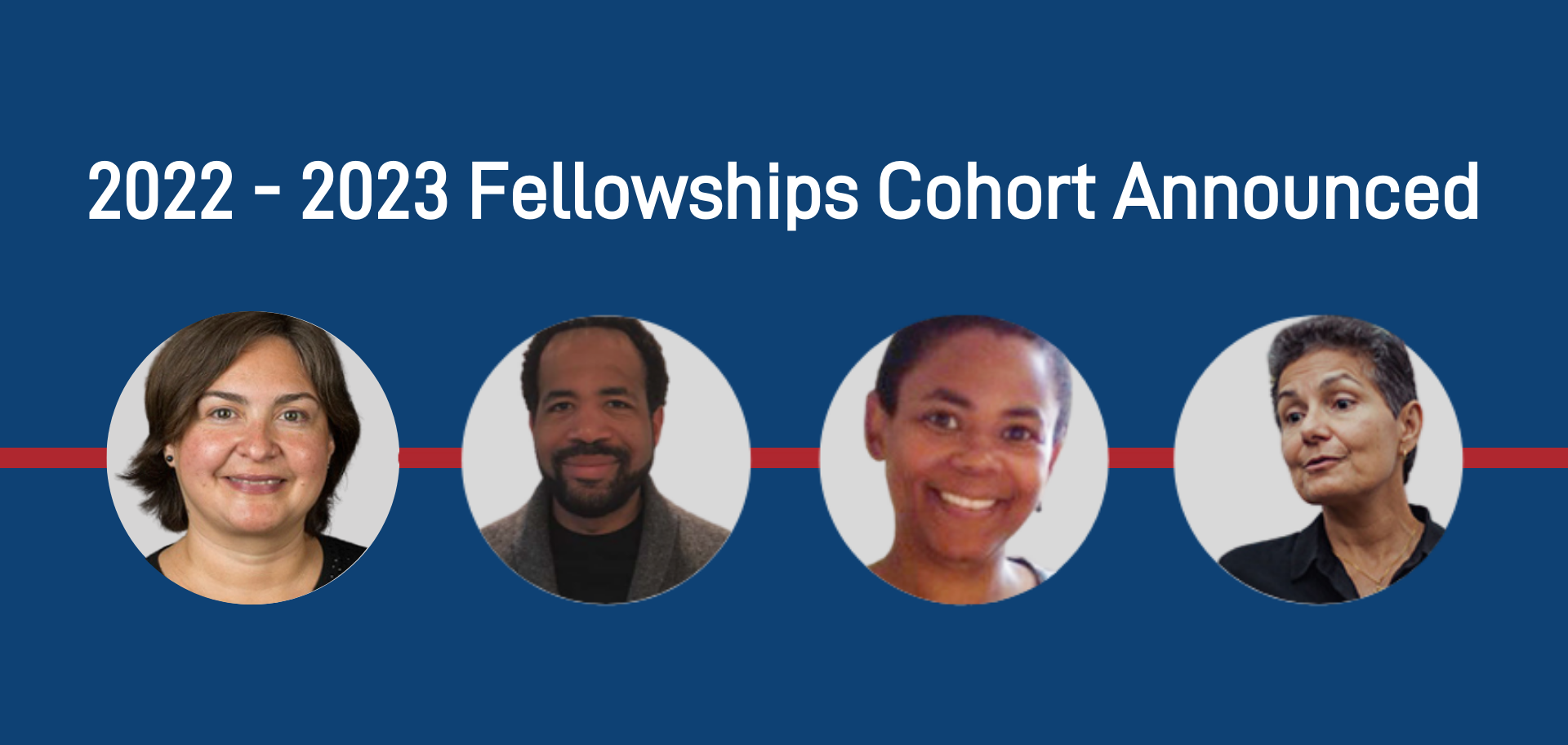 The 2022-23 Social Transformation Research Collaborative faculty fellows (left to right): Susana S. Martínez, Chernoh Sesay Jr., Lori Pierce and Lourdes Torres. (Graphic courtesy of Cristina Rodriguez)
The 2022-23 Social Transformation Research Collaborative faculty fellows (left to right): Susana S. Martínez, Chernoh Sesay Jr., Lori Pierce and Lourdes Torres. (Graphic courtesy of Cristina Rodriguez)
The Social Transformation Research Collaborative, housed in the College of Liberal Arts and Social Sciences, recently announced its inaugural round of faculty research and faculty professional development fellowships.
Susana S. Martínez, associate professor of Spanish and director of Peace, Justice and Conflict Studies, and Chernoh Sesay Jr., associate professor of Religious Studies, were awarded STRC Faculty Research Fellowships. These fellowships provide extended paid leave and research assistance for untenured or mid-career faculty to make progress toward publication prior to tenure and/or promotion.
Lori Pierce, associate professor of African and Black Diaspora Studies, and Lourdes Torres, Vincent de Paul professor of Latin American and Latino Studies, were awarded STRC Professional Development Fellowships. These fellowships provide tenure-line faculty in LAS the time and space necessary to learn new methods, content and approaches outside their discipline to bolster the interdisciplinary reach of their scholarship and teaching.
"LAS's activism is empowered by the scholarship of our faculty. The STRC Faculty Fellowship program is the most significant initiative I can think of when addressing the critical need to expand our collective knowledge base on issues of social transformation," says Guillermo Vásquez de Velasco, dean of LAS.
Created by a nearly
$2 million grant from the Mellon Foundation, the STRC supports research in the humanities as a source of justice and healing for communities historically shaped by, and continuously facing, racism, violence and dispossession.
More information about each faculty member's work can be found below and on the
STRC website.
Susana S. Martínez, STRC Faculty Research Fellowship
Topic: Coming of Age(ncy) on the Migrant Trail: Central American and Mexican Adolescent Journeys in Contemporary Young Adult Literature
"Forced migration is such an important social justice issue, but it's politicized with cruel rhetoric about 'open borders' and criminalization. I study young adult novels that are coming-of-age stories depicting the human cost of immigration policy. They are gripping stories about family separation that remind us that no human being is illegal. My volunteer experience with Interfaith Community for Detained Immigrants over the years has taught me so much. Before the COVID-19 pandemic, I participated in ICDI's Court Watch and Migrant Children Visitation programs. Now I'm doing Jail Visitation online in Spanish with people in ICE detention, and it's a weekly lesson in the power of sharing stories, accompaniment, human dignity and hope." – Martínez
Chernoh Sesay Jr., STRC Faculty Research Fellowship
Topic: Black Boston and the Making of African American Freemasonry: Leadership, Religion, and Fraternalism in Early America
"Hopefully, my project will help to remind us that African American efforts for freedom, equality and justice have a long and complex history. Because my project is situated during America's Revolutionary period, it speaks directly to debates about the paradoxical relationship between democracy, racism and injustice in American history. The year 2026 will mark the 250th anniversary of the Declaration of Independence, and the lead up to this anniversary has been framed by historic events: the Black Lives Matter movement, police violence and the inequities revealed and exacerbated by the COVID-19 pandemic. All of these events renew central questions about how we understand the legacies of America's founding era, and my work speaks to current conversations and debates about what democracy, citizenship and justice meant during the beginning of America." – Sesay
Lori Pierce, STRC Professional Development Fellowship
Topic: DNA Forensics and Genealogy
"My basic question is this: Does genetic science recapitulate racial essentialism? Alternatively, can it be used as a tool to destabilize the concept of race? What's interesting about the concept of race is that it means multiple things at the same time. In spite of the fact that the concept was devised to explain inferiority, we still use the term neutrally to refer to kinship groups. And in spite of the fact that most scientists and scholars who deal with human bodies have said that there is no way to divide humans into discrete, exclusive groups, it is still standard practice to think, study and produce scholarship that reinforces these fictitious racial groups. Why didn't the rise of genetic sciences destroy the concept of race? Why did mapping the human genome reinforce racial essentialism instead of undermining it? People take DNA tests and are told who or what they really are. Is this any different from using skin, hair, or eye color or other social and biological traits to determine what groups we belong to?" – Pierce
Lourdes Torres, STRC Professional Development Fellowship
Topic: Toward a History of LLEGÓ
"A major focus of the project involves telling the story of an inspiring organization of gay, lesbian and transgender Latino/a activists called the Lesbian, Gay, Bisexual and Transgender Organization (LLEGÓ), which ran for almost 20 years before folding in 2004. This organization recognized that their community's needs were being ignored and rallied to change that reality at a time when HIV/AIDS were ravishing poor and queer people of color. Although LLEGÓ had a huge impact on Latino/a LGBT organizing, there is currently no scholarly monograph attesting to its rich history, its many contributions and its ultimate demise. My project addresses this gap in the literature by documenting the history of LLEGÓ and explaining its significance as the first and only national organization LGBT organization advocating for Latino/as." – Torres